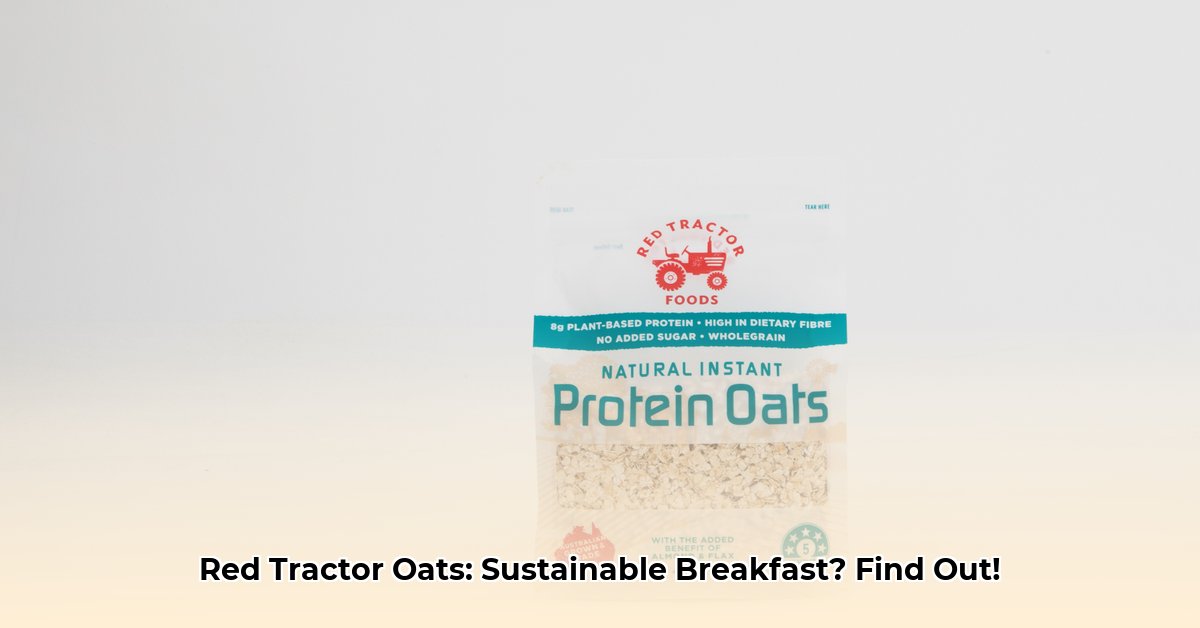
The morning rush. We grab whatever's quickest, often without a second thought to the planet's well-being. Ready-to-eat oatmeal, like Red Tractor Protein Oats, offers convenience and a protein boost, but at what cost? This article investigates the sustainability claims surrounding Red Tractor Protein Oats, exploring its environmental footprint and offering actionable steps for a truly green breakfast. For comparison, consider the sustainability of other protein sources like [high-protein pet food](https://tractor-supply-high-protein-dog-food.pages.dev).
What are Red Tractor Protein Oats?
Red Tractor Protein Oats are marketed as a convenient, high-protein breakfast option, promising eleven grams of protein per serving. Their ready-to-eat format appeals to busy consumers seeking a quick and nutritious start to the day. However, this convenience raises questions about the product's overall sustainability. The resealable bag is highlighted in marketing materials, suggesting a commitment to reducing food waste. But is this enough?
The Sustainability Claim: A Critical Look
Red Tractor's marketing emphasizes the resealable bag, implying a commitment to environmental responsibility. Yet, crucial information remains conspicuously absent. The composition of the packaging (recyclable or not?), the origin of the oats, and the overall environmental impact of their production remain unclear. This lack of transparency hinders informed consumer choices. Without a comprehensive Life Cycle Assessment (LCA), a holistic environmental impact assessment, any sustainability claim feels premature.
A Deeper Dive into Sustainability: The Need for an LCA
To understand the true environmental impact of Red Tractor Protein Oats, a Life Cycle Assessment (LCA) is essential. An LCA meticulously traces a product's journey from farm to table, measuring energy consumption, greenhouse gas emissions, water usage, and waste generation at every stage. This detailed analysis offers a complete picture, something currently missing. LCAs are widely used to evaluate the sustainability of similar products, providing a crucial benchmark for comparison. The absence of such an assessment for Red Tractor Protein Oats leaves a substantial gap in our understanding.
The Consumer Perspective: The Demand for Transparency
A growing number of consumers prioritize transparency and sustainability in their food choices. We demand to know the origin of our food, its production methods, and its impact on the environment. Clear labeling and reliable certifications play a crucial role in providing this information, guiding consumers towards responsible brands. Red Tractor Protein Oats fall short in this regard, leaving consumers with unanswered questions and a lack of confidence in their sustainability claims.
Actionable Steps Towards a Greener Breakfast
Several key players can contribute to improving the sustainability of Red Tractor Protein Oats and similar products:
Red Tractor Foods: Commission a comprehensive LCA to transparently assess its environmental footprint. Invest in sustainable sourcing practices, selecting oats from farms committed to reduced-impact agriculture and minimizing glyphosate use (a common herbicide). Explore eco-friendly packaging, focusing on recyclable or compostable materials. This proactive approach will enhance brand reputation and build consumer trust.
Consumers: Demand transparency from food companies. Support brands that openly share sustainability data and certifications. Advocate for stronger regulations regarding environmental labeling and impact disclosure.
Retailers: Prioritize products with proven sustainability credentials. Collaborate with suppliers to promote responsible agricultural practices and sustainable packaging.
Regulatory Bodies: Strengthen guidelines for environmental impact disclosure on food labels. Develop stricter standards for sustainable agricultural practices. Invest in research to identify and promote alternative, environmentally friendly methods of oat production.
Conclusion: The Path to Sustainable Breakfasts
Red Tractor Protein Oats offer undeniable convenience and a protein boost. However, a lack of transparent sustainability information prevents a definitive assessment of their environmental impact. A comprehensive LCA is urgently needed. Moving forward, a commitment to transparency from brands, informed consumer choices, and strong regulatory oversight are vital for shaping a future where sustainable breakfast options are the norm, not the exception. The path forward requires collective action.